Documentary : Science and Technology
![]()
Master Craftsmen in High Technology | Masterly Skills | Beyond the Naked Eye |
”YURU“Revolution~Creating Sports for Every One~
DC291937![]()
ゆる革命 [CBC]
![]()
![]()

|Length : 44 |Year : 2019 |
Imagine playing table tennis with a hole in your racquet, or basketball where the ball cries like a baby unless you treat it gently.
Yuru Sports are a new genre of sports with unique rules that can be played by anyone, regardless of age, sporting ability, or even disability.
This documentary follows the man behind the Yuru Sports revolution, and how these imaginative sports are actually ‘game changers’ that tackle numerous societal issues.
Tech Innovators in Japan~①Making Papers from Waste Materials ②Packing Revolution Using Unique Scales~
DC291836![]()
世界一の九州が始まる! ① 棄てられるものの輝き ②小分け革命!~はかり知れない計量器~ [RKK]
![]()
![]()
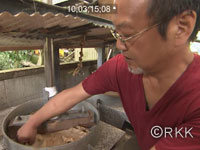
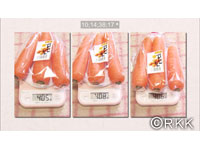
|Length : 24 |Year : 2018 |
① The "Haguregumo Workshop” in Minamata City, Kumamoto Prefecture, is a paper-making workshop started by Junpei Kanazashi thirty years ago. They use traditional materials like mulberry bark as well as banana leaves, onion skin, even worn-out jeans to make paper. Junpei’s wife Hiroko raises her own cotton and flowers to make colored cloth. According to Junpei, Japan is unique in how its art was developed through things to use in one’s life, as opposed to things to view and appreciate like in Europe. Japan was once a society of recycling, living in harmony with nature. Junpei seeks to keep that wisdom alive through his work, and to show it to the world.
② A new measuring scale is revolutionizing Japan’s vegetable sorting industry. The “Table Combi” developed by OK Planning (based in Kumamoto City) is a measuring device that notifies workers of an appropriate produce combination the moment its scales have found one. Company president Mitsuru Hatae departed his desk job in his forties and started a company with the goal of making produce packaging as easy on the workers as he could. To make measuring scales makers of produce really need, he spends his days bouncing back and forth between his office and farmer worksites. It’s been three years since they started development, and now this venture business of five employees is aiming for national and international business with their unique strategies.
SPIRIT OF JAPAN Giving Hope to Breast Cancer Patients ~The Challenge of Japanese Craftsmen~
DC291835![]()
日本のチカラ 人工乳房で微笑みを ~常滑焼「型」職人の挑戦~ [NBN]
![]()
![]()
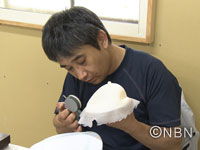
|Length : 26 |Year : 2018 |
Tokoname City is located in the center of the Chita Peninsula West Coast in Aichi Prefecture. It is also home to the Chubu Centrair International Airport – the entrance to Japan’s central region. Tokoname is known for its traditional ceramics industry and rows of shops selling pottery and earthenware.
The Maeda Mold introduced in this episode is made by a small business that has been creating plaster molds for ceramic ware for over half a century.
Cheap foreign-made ceramics and other earthenware have driven many of Tokoname’s potters out of business; however, Maeda Mold has been seeking new avenues of revenue to keep the business alive.
One of these new ventures is artificial breasts made of silicon.
Driving this successful business are the skills of the artisans who create the pottery molds used by Maeda Mold. The company has taken the bold step of applying these techniques to create artificial breasts.
These artisans had a strong desire to utilize the traditional techniques of their craft to make breast cancer patients smile by creating artificial breasts. They hoped these women can enjoy soaking in a hot spring with their friends or taking a bath with their young children, which are common in Japan, and doing other everyday things that women with natural breasts can easily do. After a series of trial and error, the artisans have successfully created a completely natural looking breast.
Maeda Mold’s artificial breast business has developed into a key revenue source that currently accounts for about a quarter of all of its sales. This story illustrates the dedicated efforts of these Tokoname ware artisans, who have found a way to use the techniques that have supported the traditional ceramics industry to bring joy to breast cancer patients.
“SHIKAKE”~Ideas That Trigger Behavioral Change~
DC291834![]()
つい、人は… [CBC]
![]()
![]()
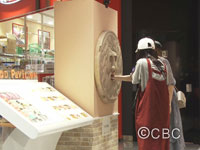
|Length : 48 |Year : 2018 |
You're in the men's bathroom. You see a target in the urinal. What do you do? You aim at it, right?
You see a basketball hoop and net. What do you want to do? You want to toss something through it, right?
If you see a viewing tube, what urge do you feel? You feel compelled to look through it, right?
Welcome to the fascinating world of "shikakeology," the brainchild of a Japanese professor who singlehandedly created an academic discipline that applies psychology to manipulate human behavior without people even realizing that they were influenced. Many of the issues we face in society today are the products of our own behavior. The problem, however, is that if someone tells us to correct our behavior, we tend to be reluctant, and if someone orders us to do it, we might even resist complying at all. But if people can be "triggered" into wanting to do something, changing their behavior is not that difficult at all.
In this program, we will explore the research of a professor who believes “SHIKAKE” is the means to trigger people toward positive changes in behavior.
It really takes much less than you might think.
The Doorway to Dreams+ ~Potato Power Saving Japan~
DC291738![]()
『夢の扉+』イモが新エネルギーに!?“イモ発電”で日本の電力不足を救え! [TBS]
![]()
![]()
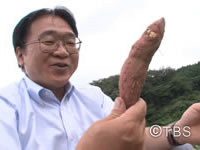
|Length : 24 |Year : 2017 |
Takahiro Suzuki, professor in the Biology and Science department at Kinki University is pursuing his dream of making Japan an energy-independent nation using an alternative to fossil fuels. “To supply 10% of Japan’s electricity by generating power using sweet potatoes”.
Sweet potatoes are highly combustible, but hardly emit anything harmful when burnt, and they can be cultivated easily anywhere in Japan.
Suzuki was previously a bioenergy researcher with a strong belief that research was meaningless unless it could be put to actual use. This drove him to search for an alternative and practical energy source, eventually coming up with thermal power generation using sweet potatoes.
The first steps toward realizing the dream of spreading potato power generation throughout Japan are being taken in the prefecture where this vegetable was first introduced. A new project in this region will attempt to use potato power to run an electric motorbike. Join us to see the result.















